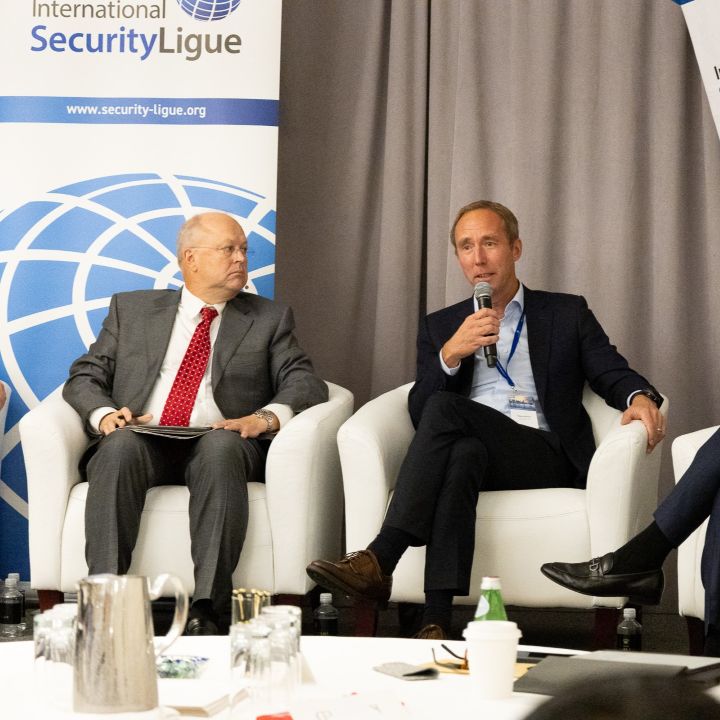
The International Security Ligue Private Security Leadership Forum brought together industry leaders, technologists, and strategists to explore seismic shifts underway in private security. From quantum computing to geopolitical realignment, conversations underscored both the urgency and opportunity in fostering future resilience.
Data, Digital, and the Strategic Imperative
Ligue Chairman Magnus Ahlqvist set the stage with a clear message: data and digital platforms are no longer peripheral—they are central to the future of security. The transformation was examined in a panel discussion and a keynote by Gerry Parham, Global Research Leader for Security at the IBM Institute for Business Value. Specifically, one question examined was: What does the coming quantum age mean for us in the security industry?
Consensus is that rapid development of quantum computing is both a short-term risk and a long-term opportunity:
• Quantum-safe encryption is becoming critical now. Many systems—passports, cars, digital signatures—have long lifecycles and are vulnerable to "harvest now, decrypt later" attacks.
• Quantum computers will outperform traditional systems within a decade, solving problems in seconds that would take classical machines millennia.
• Behavioral analysis, sensor placement, and supply chain mapping are areas where quantum could revolutionize operations.
In emphasizing the exponential growth in AI capabilities, Parham cited a warning from IBM’s CISO, Koos Lodewijkx, who notes that the biggest threat may be our own lack of imagination—both in anticipating adversaries and in evolving our own operations.
One of the biggest threats is not any adversary, but our own lack of imagination. Koos Lodewijkx — CISO, IBM
Leadership and Strategy in a Quantum World
One panelist likened the transition to Y2K: solvable, but only with focus. Vendors must step up, as any problem facing clients is an issue for providers, and quantum computing will usher in new risks, including enabling attackers to forge digital signatures, exposing vulnerabilities in Blockchain Systems, and compromising IoT devices that often use lightweight cryptography.
Ultimately, the world’s security leaders agreed that action should start now:
• Q-Day—the moment quantum breaks current encryption—is coming. The math to protect systems exists, but implementation lags.
• Inventory your systems. Knowing where your vulnerabilities lie is the first step toward resilience.
• Join consortia. Collaboration is key to shaping standards and best practices and liability and insurability in a quantum world will require industry-wide dialogue.
Quantum + AI: A Powerful Convergence
One provocative question examined is whether quantum computing will turbocharge or negate AI. In Parham’s view, quantum and AI are complementary. Quantum could supercharge AI’s ability to run complex simulations, while AI investments today lay the groundwork for quantum readiness.
It was also noted that ROI-driven pilots will become essential to leveraging quantum capabilities to enhance security, and a look into the potential future suggests how quantum computing may impact influence security services. For example, it was envisioned that in bidding for the 2032 Olympics, a winning security firm may need to offer quantum enhanced capabilities for:
• enhanced threat modeling;
• crowd management and situational awareness; and
• real-time surveillance across all surfaces and stakeholders.

Dynamic Geopolitics and Security Posture
The rapidly changing geopolitical environment and its impact on security interests also took center stage at the Ligue Leadership Forum, which included the perspective of Ulrich Brechbühl, who served as Counselor at the U.S. State Department under the first Trump Administration.
Brechbühl emphasized that post–Cold War optimism gave way to tech acceleration, demographic shifts, and a more complex deterrence landscape. Today, energy independence and economic resilience have risen to the top of the security agenda, he said.
Brechbühl also suggested that private security has a growing role in the security of nations, as under-resourced law enforcement worldwide means private security firms must fill critical gaps. Public-Private Partnerships (PPP) flourish where public resources lag, exemplified in the UK where civil-nuclear policing is now handled by private firms.
The panel discussion consensus was that a "total defense" model, a strategy where all sectors of society, not just the military, are mobilized and integrated for national security and adopted by countries including Finland, is a burgeoning trend that will raise the bar for private security. Stable, quality security partners with proven interoperability will be in increasing demand.
Under-resourced law enforcement means private security firms must fill critical gaps. — Ulrich Brechbühl
To meet the moment, leading security firms will need to continue their existing efforts to:
• leverage explicit PPP frameworks where possible;
• elevate strategic dialogues with national and multilateral regulators on total-defense planning; and
• expand capabilities into non-traditional domains—like economic security and supply-chain resilience—to stay ahead of emerging threats.






